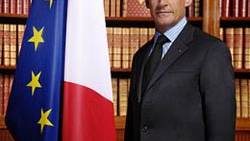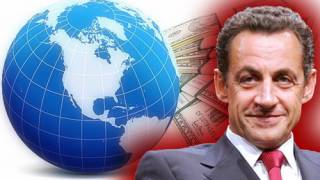Operation Sarkozy
Source: axisoflogic.com
How the CIA planted one of its agents as President of the French Republic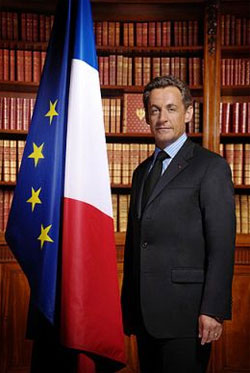 Nicolas Sarkozy should be judged on his actions and not on his personality.
Nicolas Sarkozy should be judged on his actions and not on his personality.But when his actions surprise even his own electors, it is legitimate to examine in detail his biography and to ask about the alliances which brought him to power. Thierry Meyssan decided to write the truth about the origins of the President of the French Republic. All the information contained in this article is verifiable, with the exception of two imputations, pointed out by the author who assumes sole responsibility for them.
The French people, weary of the over-long presidencies of François Mitterrand and Jacques Chirac, elected Nicolas Sarkozy and counted on his energy to revitalise their country. They hoped for a break with the years of immobilism and superannuated ideologies. They have had a break with the principles which form the foundation of the French nation. They have been stupefied by this "hyper president", every day grabbing hold of another new file, drawing the right and the left to him, thus disposing of all the land-marks to the point of creating complete confusion.
Like children who have just done something very stupid, the French are too busy finding excuses to admit the extent of the damage and of their naïvety. This makes them refuse all the more to see who Nicolas Sarkozy is, which they ought to have realised long ago.
The man is clever. Like an illusionist, he has diverted their attention by offering them his private life as a spectacle and in posing in celebrity magazines, to the point of making them overlook his political history.
Let the sense of this article be fully understood: it is not to reproach Mr Sarkozy with his links of family, friends and professional contacts, but to reproach him with having hidden his links from the French people who believed that they were electing a free man.
To understand how a man in whom all agree they see an agent of the United States and Israel has been able to become the head of the Gaullist party, then the President of the French Republic, one must go back in time. Far back. We must follow a long digression during which we shall introduce the protagonists who are today taking their revenge.
Family secrets
At the end of the Second World War, the USA secret services counted on the Italo-US godfather Lucky Luciano to control the security of American ports and to prepare the allied landings in Sicily.
Luciano's contacts with the US services passed above all through Frank Wisner Sr. then, when the 'godfather' was freed and went into exile in Italy, through his Corsican 'ambassador', Étienne Léandri.
In 1958, the United States, worried about a possible victory of the FLN in Algeria which would have opened North Africa to Soviet influence, decided to give rise to a military coup d'état in France. The operation was organised jointly by the Planning Direction of the CIA - in theory run by Frank Wisner Sr.- and by NATO. But Wisner had already sunk into dementia so that it was his successor, Allan Dulles, who supervised the action. From Algiers, the French Generals formed a Committee of Public Safety which exerted pressure on the civil government in Paris and forced it to give full powers to General De Gaulle without any need to use force.
However, Charles De Gaulle was not the pawn whom the Anglo-Saxons believed they could manipulate. To start with, he tried to find a way out of the colonial contradiction by giving wide autonomy to the overseas territories within a French Union. But it was already too late to save the French Empire since the colonised peoples did not believe in the promises from the metropolis and insisted on their independence. After having successfully led fierce campaigns of repression against the independentists, De Gaulle realised what had to be done. Showing rare political wisdom, he decided to give each colony its independence.
This U-turn was seen as a betrayal by most of those who brought him to power. The CIA and NATO then backed all sorts of plots to get rid of him, including a failed putsch and some forty attempts to assassinate him. However, some of his partisans approved of his political evolution. Around Charles Pasqua, they formed the SAC, a militia to protect him.
Pasqua is both a Corsican crook and a former member of the resistance. He married the daughter of a Canadian bootlegger who made a fortune during prohibition. He ran the Ricard company which, after having dealt in absinthe, a forbidden drink, made itself respectable by selling anisette. However, the company continued to serve as a cover for all sorts of deals in relation with the Italo-New Yorker Genovese family, that of Lucky Luciano. It was therefore not surprising that Pasqua called on Étienne Léandri (Luciano's "ambassador") to recruit strong arm men and build up a Gaullist militia. A third man played an important role in the formation of the SAC, De Gaulle's former body-guard, Achille Peretti -another Corsican.
Thus protected, De Gaulle drew up with panache a policy of national independence. While confirming that he belonged to the Atlantic camp, he questioned the Anglo-Saxon leadership. He objected to the entry of the United Kingdom into the European Common Market (1961 and 1967); he refused the deployment of UNO blue helmets in the Congo (1961); he encouraged Latin American states to break free of US imperialism (speech in Mexico, 1964); he expelled NATO from France and withdrew form the Integrated Command Structure of the Atlantic Alliance (1966); he denounced the Viet-Nam War (speech in Phnon Penh, 1966); he condemned Israeli expansionism during the Six Day War (1967); he supported the independence of Quebec (speech in Montreal 1967) ; etc...
At the same time, De Gaulle consolidated France's power by giving it a military-industrial complex including a nuclear dissuasion force, and by guaranteeing its supply of energy. He usefully separated the troublesome Corsicans from his entourage by giving them overseas missions. Thus Étienne Léandri became the dealer for the Elf group (now Total), while Charles Pasqua became the confidant of the heads of state in French-speaking Africa.
Aware that he could now defy the Anglo-Saxons everywhere at the same time, De Gaulle allied himself with the Rothschild family. He chose as Prime Minister the Director of the Bank, Georges Pompidou. The two men formed an efficient tandem. The political audacity of the first never lost sight of the economic realism of the second.
When De Gaulle resigned, in 1969, Georges Pompidou briefly succeeded him as President before being carried off by cancer. The historical Gaullists did not accept his leadership and were worried by his excessively anglophile attitude. They cried treason when Pompidou, seconded by the Secretary General of the Elyse Eduard Balladur, allowed "perfidious Albion" into the European Common Market.
The making of Nicolas Sarkozy
Having thus described the background, let us come back to our principal personage, Nicolas Sarkozy. Born in 1955, he was the son of a Hungarian nobleman, Pal Sarkösy de Nagy-Bocsa, who fled to France after fleeing the Red Army, and Andrée Mallah, a Jewish lady from Sallonica. After having had three children (Guillaume, Nicolas and François), the couple divorced. Pal Sarkösy de Nagy-Bocsa remarried with an aristocrat, Christine de Ganay, by whom he had two children (Pierre-Olivier and Caroline). Nicolas was not brought up by his parents alone, but passed to and fro in this recomposed family.
His mother became the Secretary of Achille Peretti. After having co-founded the SAC, De Gaulle's body-guard had pursued a brilliant political career. He was elected Député and Mayor of Neuilly-sur-Seine, the richest suburb of the capital, then President of the National Assembly.
Unhappily, in 1972, Achille Peretti was subject to serious accusations. In the United States, the magazine Time revealed the existence of a secret Corsican criminal organisation the 'Union corse ' which was said to control a large share of the traffic in drugs between Europe and America, the famous "French connection" which Hollywood brought to the screen. Based on parliamentary hearings and its own investigations, Time quoted the name of a Mafia boss, Jean Venturi, arrested some years earlier in Canada, who was no other than the commercial representative of Charles Pasqua for the drinks company Ricard. The names of several families were mentioned who were said to run the "Union corse", including the Perettis. Achille denied this, but had to resign from the presidency of the National Assembly and even escaped from a "suicide".
In 1977, Pal Sarközy separated from his second wife, Christine de Ganay, who then linked herself with the number two of the central administration of the Department of State in the United States. She married him and set up home with him in America. The world being small, as is well known, her husband was no other than Frank Wisner Jr., the son of the previous one. The functions of Junior at the CIA are not known, but it was clear that he had an important role there. Nicolas, who remained close to his step-mother, his half-brother and his half-sister, began to turn towards the United States where he "benefitted" from training programmes in the Department of State.
At the same time, Nicolas Sarkozy joined the Gaullist Party. He there met and had contacts with Charles Pasqua more speedily as he was not only a national leader, but also in charge of the local section in the Hauts-de-Seine.
In 1982, Nicolas Sarkozy, having completed his legal training and having been called to the Bar, married Achilles Pretty's niece. His best man was Charles Pasqual. As an Avocet, Maître Sarkozy looked after the interests of the Corsican friends of his mentors. He bought a property in Corsica, at Vice, and thought of making his name more Corsican by replacing the 'y' with an 'I': Sarkozy.
The following year, he was elected Mayor of Neuilly-sure-Seine in the place of his uncle-in-law, Achilles Pretty, stricken by a heart attack.
However, Nicolas did not take long to betray his wife and, from 1984 onward, he had a hidden liaison with Cecilia, the wife of the most famous French television personality at the time, Jacques Martin, whom he had met when celebrating their marriage as Mayor of Neuilly. This double life lasted for five years, before the lovers left their respective spouses to set up a new household.
Nicolas was a witness at the marriage, in 1992, of Jacques Chirac's daughter, Claude, to an editorialist at Le Figaro. he could not stop himself from seducing Claude and to have a brief affair with her, while living officially with Cecilia. The betrayed husband committed suicide by taking drugs. The break between the Chirac's and Nicolas Sarkozy was brutal and permanent.
In 1993, the left lost the parliamentary elections. President François Mitterrand refused to resign and entered into a cohabitation with a Prime Minister from the right, Jacques Chirac. His ambition was to become President and thought of then forming a tandem with Eduard Balladur comparable with that of De Gaulle and Pompidou, and he refused to be Prime Minister again and left the place to his "friend for over thirty years", Eduard Balladur. Despite his dubious past, Charles Pasqual became Minister of the Interior. Even if he kept a firm grip Moroccan marijuana, he took advantage of his position to legalise his other activities by taking control of the casinos, gaming and racing in French-speaking Africa. He also established links in Saudi Arabia and in Israel an became an honorary officer in the Mossad. As for Nicolas Sarkozy, he was Minister of the Budget and government spokesman.
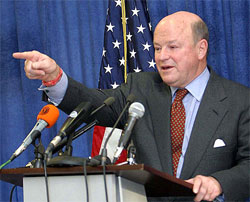 Frank Wisner Jr. |
This was when the tension within the Gaullist Party came back as thirty years earlier between the historic Gaullists and the financial right, in the person of Balladur. The novelty was that Charles Pasqua and with him the young Nicolas Sarkozy betrayed Jacques Chirac to come closer to the Rothschild tendency. Everything went wrong. The conflict reached its peak in 1995 when Édouard Balladur put himself forward against his ex-friend Jacques Chirac for the presidential election, and was beaten. Above all, following the instructions received from London and Washington, the Balladur government opened negotiations for adhesion to the European Union and to NATO of the States in Central and Eastern Europe, freed from Soviet control.
Everything went wrong in the Gaullist Party where the friends of yester-year were ready to kill one another. To finance his electoral campaign, Édouard Balladur tried to get hold of the Gaullist Party's black funds, hidden within the double accounting system of the oil company Elf. Hardly had the old Étienne Léandri died, when Judges looked into the company and its bosses were incarcerated. But Balladur, Pasqua and Sarkozy never managed to recuperate the booty.
Crossing the desert
Throughout his first term, Jacques Chirac kept Nicolas Sarkozy at a distance. The man became discreet during this long period of crossing the desert. Discreetly, he continued to make links in financial circles.
In 1996, Nicolas Sarkozy having finally managed to end an endless divorce procedure married Cécilia. As witnesses they had the two billionaires Martin Bouygues and Bernard Arnaud (the richest man in the country).
Last act
Well before the Iraq crisis, Frank Wisner Jr. and his colleagues at the CIA were planning the destruction of the Gaullist line and the rise in power of Nicolas Sarkozy. They acted in three stages: firstly the elimination of the leaders of the Gaullist Party and taking over this body, then the elimination of the principal rival on the right and the investiture by the Gaullist Party for the presidential election, and finally the elimination of any serious challenger from the left in order to be sure of carrying off the presidential election.
For years, the media were kept excited by posthumous revelations by a real property speculator. Before dying of a serious illness, he had registered for reasons never made clear a video confession. For even more obscure reasons, the "cassette" fell into the hands of a highly placed member of the Socialist Party, Dominique Strauss-Khan, who passed it on indirectly to the press.
Even if the confessions of the speculator did not lead to any judicial sanction, they opened a Pandora's box. The principal victim of the successive affairs was to be the Prime Minister Alain Juppé. To protect Chirac, he alone took on all the criminal offences. Putting Juppé out of the way left the way clear for Nicolas Sarkozy to take over the running of the Gaullist Party.
Sarkozy then made use of his position to force Jacques Chirac to take him back into the government, despite their mutual hatred. He was definitively to be the Minister of the Interior. What a mistake! In this post, he controlled the Préfets and the interior intelligence network which he used to put his appointees into the major branches of the administration.
He also dealt with Corsican matters. The Préfet Claude Érignac had been assassinated. Although no-one had claimed it, the murder was immediately interpreted as a challenge made by the independentists to the Republic. After a long hunt, the police managed to arrest a fleeing suspect, Yvan Colonna, the son of a Socialist Député. Without regard for the presumption of innocence, Nicolas Sarkozy announced this arrest accusing the suspect of being the assassin. This news was too good two days before a referendum being organised by the Minister of the Interior in Corsica to modify the status of the Island. However that may be, the voters rejected the Sarkozy project which, according to some, favoured Mafia interests.
Although Yvan Colonna was later found guilty, he has always claimed his innocence and no material evidence has been found against him. Strangely, the man refused to talk, preferring to be found guilty than to reveal what he knows. We here reveal that the Préfet Érignac was not killed by nationalists, but shot by the hit-man, Igor Pecatte, immediately sent off to Angola where he has been taken on by the Elf group. The motive for the crime was closely linked to the previous functions of Érignac, in charge of the African networks of Charles Pasqua at the Ministry of Cooperation. As for Yvan Colonna, he has been a personal friend of Nicolas Sarkozy for many years and their children are in friendly contact with one another.
A new affair came to light: false listings were circulating which untruthfully accused certain personalities of hiding bank accounts in Luxembourg, with Clearstream. Among the personalities defamed: Nicolas Sarkozy. He took the case to court and let it seem that his right-wing rival for the presidential election, the Prime Minister, Dominique de Villepin, had organised this machination. He did not hide his intention to have him sent to prison. In reality, the false listings were put in circulation by members of the Franco-American Foundation, of which John Negroponte was the President and Frank Wisner Jr. the Director. What the Judges did not know and we reveal here was that the listings were made in London by a joint office of the CIA and the MI6, Hakluyt & Co, of which Frank Wisner Jr. is also Director. Villepin fights back against the accusations, but he is charged, forbidden to leave his home and, de facto, temporarily removed from political life. The way is open for on the right for Nicolas Sarkozy.
It remained necessary to neutralise opposition candidates. The membership dues to the Socialist Party have gone down to a symbolic level to attract new members. Suddenly thousands of young people applied for membership cards. Among them are at least ten thousand new members who are in reality members of the Trotskyite "Lambertist" Party (so called from the name of their founder Pierre Lambert). This small extreme left formation has a history of working for the CIA against the Stalinist communists during the Cold War (it was the equivalent of the SD/USA of Max Shatchman, which formed the neoconservatives in the USA). This was not the first time that the "Lambertists" had infiltrated the Socialist Party.
In particular they planted two famous CIA agents: Lionel Jospin (who became Prime Minister) and Jean-Christophe Cambadélis, the principal adviser to Dominique Strauss-Kahn.
Primaries were organised in the Socialist Party to appoint its candidate for the presidential election. Two personalities were competing: Laurent Fabius and Ségolène Royal. Only the first represented a danger for Sarkozy. Dominique Strauss-Kahn became a candidate with the task of eliminating Fabius at the last moment. This he was able to do thanks to the votes of the infiltrated "Lambertist" militants who voted not for him but for Royal. The operation was possible because Strauss-Kahn, of Moroccan Jewish origin, had been on the US payroll for many years. The French were not aware that he lectured at Stanford, where he had been taken on by the Provost of the University, Condoleezza Rice. As soon as he took office, Nicolas Sarkozy and Condoleezza Rice thanked Strauss-Kahn by having him appointed to head the International Monetary Fund.
First days at the Élysée Palace
On the evening of the second round of the presidential election, when the opinion polls announced his probable victory, Nicolas Sarkozy made a short speech to the nation from his campaign HQ. Then, contrary to custom, he did not go to celebrate with the militants of his party, but went to Fouquet's. The famous restaurant on the Champs-Élysées, which had once been the meeting place for the "Union Corse" now belongs to the casino operator Dominique Desseigne. It was placed at the disposition of the elected President to receive his friends and principal donors to his campaign. A hundred or so guests crowded in, the richest men in France were there with the casino bosses.
Then the elected President allowed himself a few days of earned rest. Taken there in a private Falcon-900 to Malta, he rested there on the Paloma, the 65 metre yacht of his friend Vincent Bolloré, a billionaire formed at the Banque Rothschild.
Finally, Nicolas Sarkozy was invested as President of the French Republic. The first decree which he signed was not to proclaim an amnesty, but to allow casinos to be operated by his friends Desseigne et Partouche and increase the number of gambling machines.
He formed his working team and his government. With no surprise, one finds there a very worrying casino owner (Minister of Youth and Sport) and lobbyist for the casinos of his friend Desseigne (who became spokesman for the "Gaullist" Party).
Nicolas Sarkozy relied above all on four men: Claude Guéant, Secretary General of the Élysée Palace. He was the former right arm of Charles Pasqua. François Pérol, Assistant Secretary General of the Élysée. He was a managing partner of the Banque Rothschild. Jean-David Lévitte, diplomatic adviser. Son of the former Director of the Jewish Agency. French Ambassador to UNO, he was removed from his post by Chirac who considered him too close to George Bush. Alain Bauer, the man in the shadow. His name does not appear in any directory. He is in charge of the intelligence services. Grandson of the Grand Rabbi of Lyon, former Grand-Master of the Grand Orient of France (the principal Masonic obedience in France) and former number 2 of the USA National Security Agency in Europe.
Frank Wisner Jr., who had in the meantime been appointed special envoy by President Bush for the independence of Kosovo, insisted that Bernard Kouchner be appointed Minister for Foreign Affairs with a dual priority mission: The independence of Kosovo and the ending of France's Arab policy.
Kouchner, of Baltic Jewish origin, started his career by taking part in creating a humanitarian NGO. Thanks to money from the National Endowment for Democracy, he took part in operations for Zbigniew Brzezinski in Afghanistan, alongside Osama Ben Laden and the Karzaï brothers against the Soviets. He could be found in the 90s alongside Alija Izetbegoviç in Bosnia-Herzegovina. From 1999 to 2001, he was the High Representative of UNO in Kosovo.
Under the control of the younger brother of President Hamid Karzaï, Afghanistan became the largest producer in the world of opium poppies. The juice is transformed on the spot into heroin and transported by the US Air Force to Camp Bondsteed (Kosovo). There the drug is taken over by the men of Haçim Thaçi who distribute it principally in Europe and also in the United States. The profits are used to finance the illegal operations of the CIA. Karzaï and Thaçi are long-time personal friends of Bernard Kouchner, who obviously knows nothing of their criminal activities despite the international reports which have been made on the subject.
To complete his government, Nicolas Sarkozy appoints Christine Lagarde, Minister of Economy and Finance. She had made all her career in the United States where she ran the prestigious law firm of Baker & McKenzie. Within Dick Cheney's the Center for International & Strategic Studies, she co-chaired with Zbigniew Brzezinski a working group which supervised the privatisations in Poland. She had organised intense lobbying for Lockheed Martin against the French aircraft manufacturer Dassault.
A new escapade during the summer. Nicolas, Cécilia, their joint mistress and their children were offered holidays in the USA at Wolfenboro, not far from President Bush's property. The bill this time was paid by Robert F. Agostinelli, an Italo-New York merchant banker, a Zionist and a leading neo-conservative who gives his views in Commentary, the magazine of the American Jewish Committee.
The success of Nicolas spreads to his half-brother Pierre-Olivier. Under the Americanised name of "Oliver", he was appointed by Frank Carlucci (who was the number 2 of the CIA after having been recruited by Frank Wisner Sr.) Director of a new investment fund of the Carlyle Group (the joint management company of the portfolios of the Bushes and the Ben Ladens). Having become the 5th deal-maker in the world, he manages the principal assets of the sovereign funds of Kuwait and Singapore.
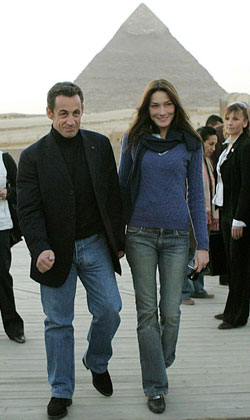 Sarkozy with Carla Bruni on a trip to the pyramids (Reminiscent of Napoleon, another Rothschild Supported "Emperor") |
When will the French open their eyes to see what they should do?
© Copyright 2008 by AxisofLogic.com (Translation Copyright)
This Axis of Logic translation is available for republication as long as reprints include verbatim copy of the article its entirety, respecting its integrity. Reprints must cite the author, translator and Axis of Logic as the original source including a "live link" to the article. Thank you!
Article from: http://axisoflogic.com/artman/publish/article_27642.shtml
